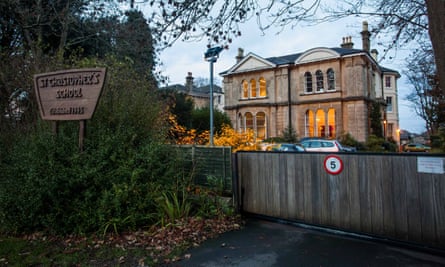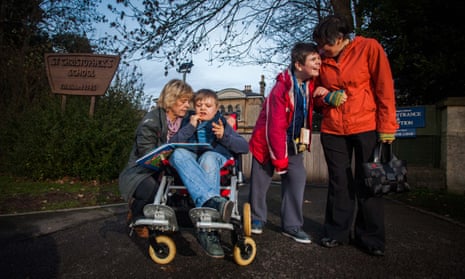The families of children with severe and complex learning difficulties have expressed shock and anger after their “unique” school announced it is to close within weeks.
St Christopher’s School in Bristol, which for 70 years has educated and cared for thousands of the most vulnerable boys and girls, is to shut partly because cash-strapped local authorities can no longer afford to pay for children to go there.
Schools such as St Christopher’s are rare because as well as offering tried and tested therapies they also have a permanent medical staff on site to deal with health needs and emergencies.
Families and carers are scrambling to find places for the 38 children who are at the residential school. Some have been told that alternatives are hundreds of miles away.
Paediatric experts have said the situation reflects the problem of a shortage of residential places for children with complex learning difficulties and the growing problem of local authorities not being able to afford to pay for such places even when they still can be found.
Suzanne Baxter, whose 15-year-old son Harry attends the school, said she had been told there might be a place for him in Guildford, Surrey, 125 miles from her home in south Wales – but not until September.
Baxter, a vet, said her son had a range of problems including significant learning difficulties and severe epilepsy but since starting at St Christopher’s last January had been content and stable.
She said: “Harry has blossomed into a young man with friends and a social life. He is happy – you only have to hear him laughing with the staff and see his face when interacting to know this.
“The medical team have coped incredibly – they seem to appear in an instant carrying necessary equipment within seconds of him needing them. This care has been outstanding, none of Harry’s previous settings – school or respite – coped so seamlessly. Many of the children at this school have so many complex and differing needs, but all seem to be catered for in a non-intrusive way. The general atmosphere is one of a laid-back youth club with a general feeling of contentment and harmony.”
Places at St Christopher’s, an independent school, are expensive. One parent told the Guardian that Bath and North East Somerset council spent £188,000 for a year’s placement for his son. Some spend less time there so the fees are smaller; others need even more intense care and so cost more.
In a statement the school said it would close by the end of March. It expressed “great sadness” but said a combination of a reduction in referrals and the fact that those who were sent had such complex needs meant the school had become “economically unviable”.

Trustee Dr Oliver Stanley, a retired paediatrician, said the school had tended to be a place of “last resort”, adding: “These are very often children who they [local authorities] cannot place anywhere else.” He said it had cared for children from all over south England, including London, as well as the south-west and the Midlands. “The more specialist the provision, the fewer places there are,” he said.
But pupil numbers had fallen because local authorities were reluctant to send children to residential schools. Stanley said: “It will be very hard on the children and the parents. Parents have often fought very long and hard to get their children into St Christopher’s.”
Sarah Lambert, head of policy at the National Autistic Society, said: “Families will be distressed by the closure and what this means for their son or daughter. Some parents are understandably concerned that their children’s needs won’t be met locally and that they’ll have to travel long distances to get the right support.
“The law is clear on this issue – the local authority must assess the needs of children with complex needs and secure appropriate support to meet those needs. This has to be their first priority.
“People on the autism spectrum rely on routine to navigate what can be a confusing world, so big changes like moving schools can be extremely stressful. This is why it’s important that the local authority works closely with parents and potential schools to resolve the situation as fast as possible and make sure the children are prepared carefully for the transition.”
Archie White, 16, who has severe autism and other conditions, has been at the school since he was eight. His father, Jonty White, said his son would struggle. “Change is the great enemy,” he said. The Whites are from Devon and already have a long motorway journey to see Archie in Bristol. “Places like this are not easy to find. We don’t know what the future holds,” said White.
Shirley Carmichael, whose 13-year-old son Andrew has been at St Christopher’s for three years, said she found a place for the youngster after he became violent towards her and his siblings as well as himself. “He’s done brilliantly. It’s a unique place. When I visit now he cuddles me rather than punches me.”
After contracting meningitis as a baby, Andrew was left with a range of disabilities including cerebral palsy and hydrocephalus – a buildup of fluid on the brain – which is treated with a shunt that drains the fluid. “It means he needs constant medical care,” his mother said.
Carmichael broke down when she heard that St Christopher’s was to close, and had to leave work. She may have found somewhere for Andrew in Southampton but that is at least a two-hour drive from her home in south Gloucestershire. “These children are some of the most vulnerable in our society. If we don’t look after them, what does it say about us all?” she said.
